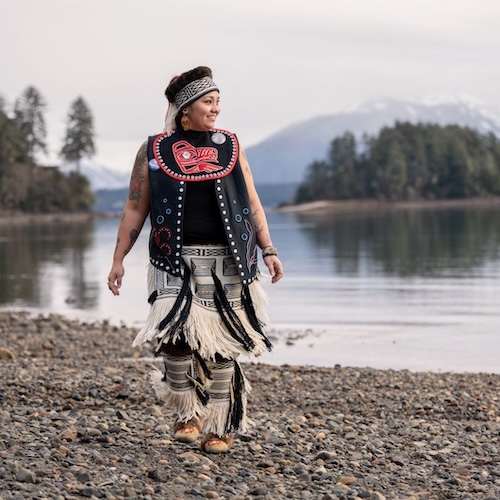Chancellor's Advisory Committee on Alaska Native Education
Updated 04/17/2025
CACANE Priorities: Updated 02/20/2025
Priority 1: Indigenous Student Success
Goal 1: Indigenous Orientation
Goal 2: Survey Students to help with student success and support
Priority 2: Indigenizing the University
Goal 3: Research develop onboarding documents for new hires
Goal 4: Request information from programs and departments on Alaska Native Student Success
Priority 3: Support Indigenous Community Connections
Goal 5: Invite community connections to CACANE meetings
Goal 6: Plan 1-2 events to establish connections
Priority 4: Shaping our Indigenous Identities
Goal 7: Make a recommendation that UAS funds a campaign for BAIS
Goal 8: Visually Indigenize classrooms
Background
The University of Alaska Southeast mission promotes student learning enhanced by the cultures and environment of Southeast Alaska. UAS values associated with the mission highlight the special importance of the histories, cultures, languages, and arts of Alaska Native peoples, and to promote cultural safety, eliminating disparities, and preventing discrimination on our campuses.
The UAS Chancellor's Advisory Committee on Alaska Native Education (CACANE) provides advice to UAS leadership about fulfilling this mission and acting on these values. In doing so, the committee's work is guided by the following:
Cultural Safety
- Individuals have the right to define themselves independent of the stereotypes of others
- Individuals have the right to define what is safe for their well-being
- Institutions operate conscious of historical traumas and current inequities
Elimination of Disparity
- Our goal is to make systemic changes within the university to ensure that success rates are similar for all students.
Increasing the Presence of Indigenous Languages and Cultures
- Our committee works to ensure that the Lingít (Tlingit), Smʼalgya̱x (Tsimshian), and X̱aad Kíl (Haida) languages are living languages that belong on our campuses and within our institutional documents.
- Our committee also works to ensure that Indigenous peoples, histories, cultures, and ways of knowing are integral parts of all things being taught on our campuses
Committee Mission
The CACANE is charged with advising UAS leadership in the following areas:
- Supporting and improving Alaska Native student recruitment, retention, and program completion
- Developing meaningful partnerships with tribes, Native corporations and non-profits, and other entities that share similar goals in fostering Alaska Native education
- Advancing respectful recognition of Alaska Native heritage
- Promoting and enhancing academic programs, pathways to student success, and student support services in the context of its mission, vision, and values
- Ensuring that UAS coordinate training for administration, faculty, and staff about Alaska Native peoples, histories, languages, arts, and cultures that highlight restorative practices and teaching methodologies that contribute to Alaska Native success
The CACANE shall provide written recommendations to the Chancellor and executive leadership.
Committee Leadership
Committee leadership shall be a UAS faculty co-chair and a UAS staff co-chair. The normal term for service will be for two years. The Associate Vice Chancellor for Alaska Native Programs shall be an ex-officio member of the committee.Current CACANE Chair Members
Judith D. Ramos, M.A.T.

Assistant Professor, Northwest Coast Arts
Volunteer activities: Cultural Advisory Committee, Alaska Native Heritage Center; Museum Collections Advisory Committee, Alaska State Museum; Commissioner, Alaska Native Science Commission; member, Museum Sovereignty Advisory Circle, CIRI Foundation; member, Eyak Language Preservation and Archive Committee
Committee Membership
Membership on the Committee shall include, but is not limited to, UAS Alaska Native faculty, staff, students, and alumni at any of UAS' three campuses. In addition, membership may be extended by mutual agreement of the co-chairs and committee members to Elders and representatives from Alaska Native organizations.
Judith Dax̱ootsú Ramos (Co-Chair), Assistant Professor, Northwest Coast Arts
Davina Cole (Co-Chair), Saak.adoo, Northwest Coast Arts Program Coordinator
Akléi Helen Dangel, Academic Advisor / Title IX Liaison
Angela A Lunda, Ph.D., Assistant Professor of Education
DáxKílatch, Kolene E. James, Multicultural Services Manager
Éedaa Heather Burge, Assistant Professor of Alaska Native Languages
Eldri Waid Westmoreland, Ph.D. (she/her), Assistant Professor of Elementary Education
Forest S. Haven, Goi'pa Sha Hana'ack, Ph.D., Assistant Professor of Anthropology and Alaska Native Studies
Janelle Cook, Panruk, Director of Financial Aid
Jennifer Brown, Assistant Professor of Anthropology
JoMarie Alba, Alaska Native Student Retention Specialist
Judith Dax̱ootsú Ramos, M.A.T., Assistant Professor, Northwest Coast Arts
Ronalda Cadiente Brown Aantooku.aat, M.A., Associate Vice Chancellor for Alaska Native Programs and Director of PITAAS
S'aḵjayéi Yarrow Vaara, Term Assistant Professor in Alaska Native Languages
Wendy K’ah Skáahluwaa Todd, Assistant Professor of Indigenous Studies & Occupational Endorsement
Xéetl’ee Katelyn Stiles, Term Assistant Professor of Indigenous Studies
X̱’unei Lance Twitchell, M.F.A., Ph.D., Professor of Alaska Native Languages
Meeting Frequency and Format
The committee will meet at least three times during the academic year. An agenda will be prepared in advance of each meeting, with prior notification of the date and location of the meetings. Provisions will be made allowing for participation at a distance from the Ketchikan and Sitka campuses. Meetings for Spring 2026 are held on the first Mondays of the month from 1:00-2:00 PM.
